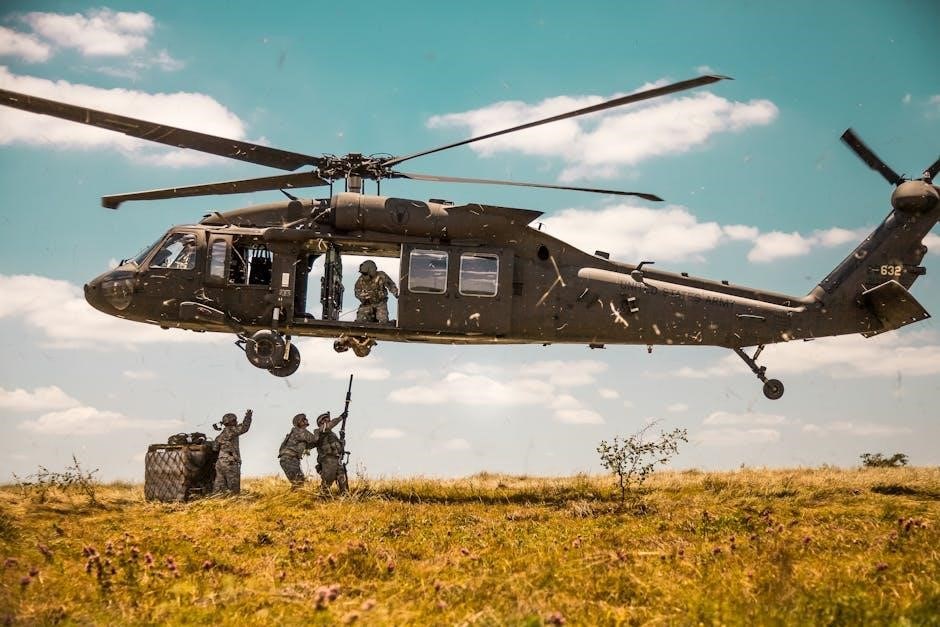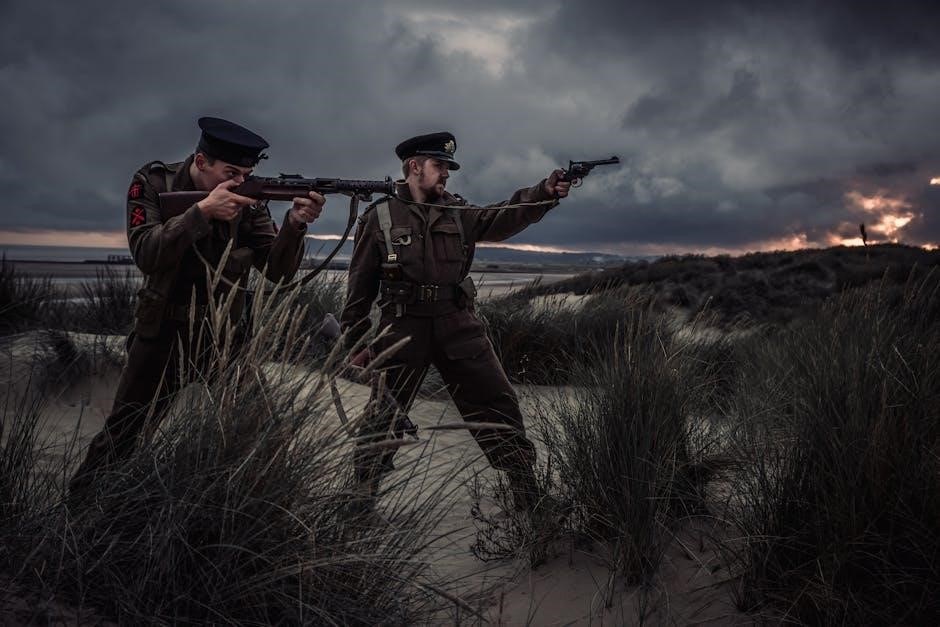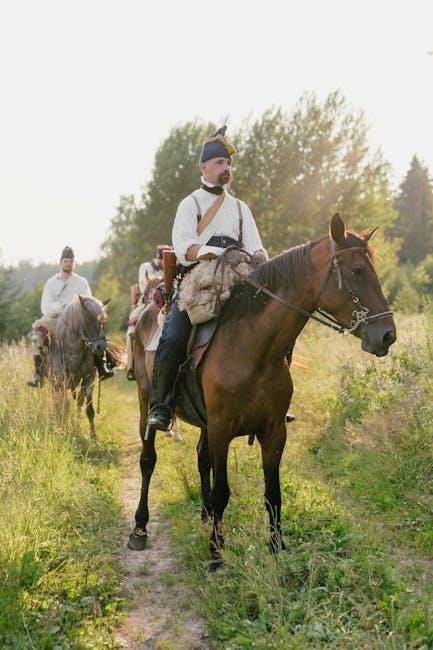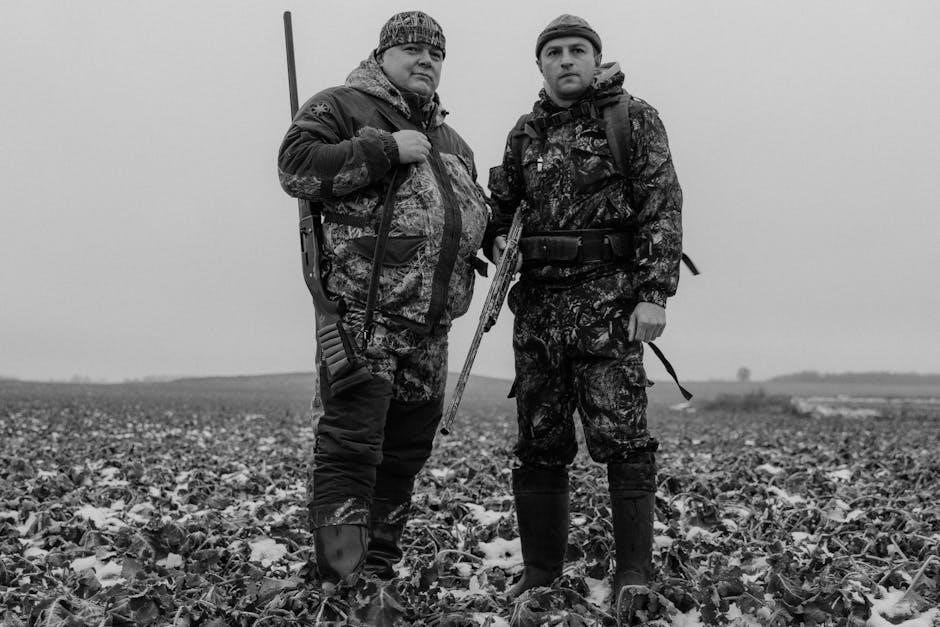Soldiers are the backbone of the military, fulfilling critical roles in defense, peacekeeping, and humanitarian missions. Their primary responsibilities include executing missions, maintaining discipline, and upholding Army values like loyalty, duty, and respect. The Soldier’s Guide outlines their obligations, ensuring they understand their role in protecting the nation and its interests. Soldiers must remain proficient in their skills, adhere to ethical standards, and embody the Warrior Ethos, which drives their commitment to the mission and their fellow soldiers.
1.1 Understanding the Soldier’s Role in the Army
Soldiers are the cornerstone of the military, fulfilling diverse roles to ensure mission success. Their primary responsibilities include executing combat and support operations, maintaining discipline, and upholding ethical standards. The Soldier’s Guide emphasizes their obligations, such as mission accomplishment and the welfare of fellow soldiers. Soldiers must also embody Army values like loyalty, duty, and respect, while adhering to customs and traditions. Their role extends beyond combat, encompassing leadership, mentorship, and professional development. Understanding these responsibilities is crucial for every soldier, as they represent the Army’s identity and contribute to national security and global peacekeeping efforts. This foundational knowledge ensures soldiers are prepared to meet challenges and lead effectively in various scenarios.
1.2 Key Responsibilities of Soldiers
Soldiers are tasked with executing missions, maintaining readiness, and upholding military standards. Their primary duties include mastering individual combat skills, adhering to ethical conduct, and contributing to unit cohesion. Soldiers are responsible for their actions, ensuring accountability in all operations. They must also support supply, maintenance, and administrative functions, which are critical to mission success. Additionally, soldiers are expected to develop professionally, stay physically and mentally fit, and embody the Army’s core values. These responsibilities ensure the Army operates effectively, maintaining discipline and achieving its objectives. By fulfilling these duties, soldiers play a vital role in safeguarding national security and upholding the Army’s traditions and identity.
The Concept of Duty, Responsibility, and Authority
Duty refers to the legal and moral obligations soldiers must fulfill, while responsibility involves accountability for actions and decisions. Authority grants soldiers the power to make decisions and take action within their rank and role, ensuring effective mission execution and adherence to military standards.
2.1 Defining Duty and Responsibility in the Military Context
Duty in the military context refers to the legal and moral obligations soldiers must fulfill, encompassing their commitment to missions and adherence to ethical standards. Responsibility involves accountability for actions, decisions, and outcomes, ensuring soldiers meet expectations and maintain discipline. These principles are foundational to military operations, fostering trust and reliability within units. Soldiers are expected to understand their specific duties, perform tasks diligently, and accept responsibility for their conduct. This dual focus on duty and responsibility ensures the accomplishment of missions while upholding the Army’s values of respect, integrity, and selfless service. Together, these concepts form the ethical framework guiding soldiers’ behavior and decision-making in all situations.
2.2 Authority and Decision-Making in the Army
Authority in the Army is derived from rank and position, enabling soldiers to execute orders and make decisions aligned with mission objectives. Effective decision-making is a critical skill, as soldiers must often act swiftly under pressure. Non-commissioned officers (NCOs) play a key role in guiding junior soldiers and ensuring decisions comply with military standards. The hierarchy of authority ensures clear chains of command, while leadership training equips soldiers to make sound judgments. Ethical reasoning and adherence to Army values, such as integrity and honor, further shape decision-making processes. This structured approach to authority and decision-making is essential for maintaining order and achieving success in military operations.
Training and Professional Development
Training is essential for soldiers, beginning with basic training and advancing to specialized skills. NCOs play a vital role in fostering leadership and expertise, preparing soldiers for leadership roles.
3.1 Basic Training and Its Importance
Basic training is the foundation of a soldier’s career, teaching essential skills and discipline. It instills Army values, physical fitness, and combat readiness, preparing soldiers for future challenges and leadership roles by building a strong moral and ethical framework.
3.2 Advanced Training and Specialized Skills
Advanced training equips soldiers with specialized skills beyond basic training, enabling them to excel in specific roles. This phase focuses on refining combat tactics, technical expertise, and leadership abilities, ensuring soldiers are prepared for complex missions. Specialized skills include advanced weaponry, strategic planning, and ethical decision-making, fostering adaptability in dynamic environments. The curriculum often covers specialized areas like medical operations, engineering, or intelligence gathering, tailored to meet modern military demands. This training is crucial for developing experts who can lead and innovate, ensuring the Army remains effective in addressing future challenges.
Leadership and Mentorship in the Army
Leadership and mentorship are vital in developing capable soldiers. Non-Commissioned Officers (NCOs) play a central role in training, guiding, and inspiring soldiers to achieve their full potential.
4.1 The Role of Non-Commissioned Officers (NCOs)
Non-Commissioned Officers (NCOs) are the backbone of the Army, responsible for training, mentoring, and leading soldiers. They oversee daily operations, enforce standards, and ensure unit discipline. NCOs advise commanders on enlisted matters and manage supply, maintenance, and administrative functions. Their primary role is to develop soldiers’ skills and readiness, preparing them for leadership. NCOs embody Army values, fostering a culture of integrity, duty, and respect. They are accountable for individual and team performance, ensuring mission success. By mentoring and guiding, NCOs shape the future of the Army, building capable and ethical leaders. Their influence is crucial in maintaining unit cohesion and achieving organizational goals.
4.2 Developing Leadership Skills for Future Challenges
Developing leadership skills is essential for soldiers to meet future challenges effectively. The Army emphasizes continuous learning and mentorship to cultivate leaders who can adapt to evolving operational environments. Soldiers are encouraged to refine their critical thinking, decision-making, and communication abilities. Training programs focus on ethical reasoning, problem-solving, and teamwork to prepare soldiers for complex scenarios. Mentorship by experienced NCOs and officers plays a crucial role in shaping future leaders. By fostering a culture of accountability and resilience, the Army ensures soldiers are equipped to lead with integrity and confidence. These efforts aim to produce adaptable, ethical, and competent leaders capable of overcoming future challenges and inspiring their teams to succeed.

Military Courtesies and Traditions
Military courtesies and traditions emphasize respect, discipline, and unity among soldiers. They uphold the Army’s identity through customs, ceremonies, and shared values, fostering pride and cohesion.
5.1 Importance of Military Customs and Courtesies
Military customs and courtesies are essential for maintaining discipline, respect, and unity within the Army. They include practices like saluting, addressing superiors, and observing ceremonies, which reflect the Army’s history and values. These traditions foster a sense of pride and belonging among soldiers, reinforcing the hierarchical structure and mutual respect. By adhering to these customs, soldiers demonstrate their commitment to the Army’s identity and uphold its legacy. Such practices also ensure consistency in behavior across all ranks, promoting a cohesive and professional military environment; They serve as a foundation for teamwork and esprit de corps, which are critical for mission success and unit effectiveness.
5.2 Traditions That Shape the Army’s Identity
Army traditions are deeply rooted in history and serve as the foundation of its identity. These customs, such as the Warrior Ethos and the Army’s core values, inspire soldiers to embody loyalty, duty, and personal courage. Ceremonies like the changing of command and retirement ceremonies honor service and legacy, fostering a sense of continuity and pride; The Army’s traditions also emphasize unity and shared purpose, reinforcing the bond among soldiers across generations. By upholding these practices, the Army preserves its heritage and ensures that its values endure. These traditions are not just rituals but a way of life that shapes the Army’s culture and the soldiers who serve.
Ethical Standards and Decision-Making
Soldiers must adhere to ethical standards, upholding the Army’s core values of loyalty, duty, respect, selfless service, honor, integrity, and personal courage. These principles guide decision-making in all situations, ensuring actions align with moral responsibilities and the greater good.
6.1 Ethical Responsibilities of Soldiers
Soldiers are bound by a strict code of ethics, rooted in the Army’s core values: loyalty, duty, respect, selfless service, honor, integrity, and personal courage. These principles guide their actions, ensuring moral decision-making in all circumstances. Soldiers must uphold ethical standards, acting with honesty and accountability. They are responsible for adhering to laws, regulations, and the Uniform Code of Military Justice. Ethical responsibilities extend to respecting the rights and dignity of others, both on and off duty. Soldiers must also avoid actions that bring discredit to the Army or undermine public trust. By adhering to these ethical standards, soldiers foster a culture of integrity and reliability, essential for mission success and maintaining the Army’s reputation as a disciplined and honorable force.
6.2 Ethical Reasoning in Combat Situations
In high-stress combat environments, soldiers must apply ethical reasoning to make sound, morally justifiable decisions. This involves balancing mission objectives with the protection of non-combatants and adherence to international laws of war. Soldiers are trained to prioritize de-escalation and minimize harm, while upholding the Warrior Ethos. Ethical reasoning ensures actions align with Army values, such as honor and integrity, even in uncertain or dangerous situations. The Soldier’s Guide emphasizes the importance of moral decision-making, equipping soldiers with frameworks to navigate complex dilemmas. Ethical reasoning fosters trust and legitimacy, both within the unit and among the populations they serve, ensuring mission success and maintaining the Army’s ethical standards. This skill is vital for upholding the moral fabric of military operations.
Combat Readiness and Individual Skills
Soldiers must maintain combat readiness by mastering individual skills such as marksmanship, first aid, and tactical maneuvers. Physical and mental fitness are crucial for mission success and survival.
7.1 Mastering Individual Combat Tasks
Soldiers must master individual combat tasks to ensure readiness for diverse missions. These skills include marksmanship, first aid, navigation, and tactical maneuvers. Proficiency in these areas is critical for survival and mission success. Soldiers are trained to perform under stress, adapting to unpredictable scenarios. Physical fitness and mental resilience are equally important, enabling soldiers to endure the demands of combat. The ability to execute tasks flawlessly ensures unit cohesion and operational effectiveness. Mastery of these skills is non-negotiable, as they directly impact the safety of fellow soldiers and the achievement of objectives. Continuous training and practice are essential to maintain and improve combat readiness.
7.2 Maintaining Physical and Mental Fitness
Maintaining physical and mental fitness is essential for soldiers to perform their duties effectively. Physical fitness includes strength, endurance, and agility, enabling soldiers to handle the demands of missions. Mental fitness involves resilience, focus, and emotional stability, crucial for making sound decisions under stress. Soldiers engage in regular exercise, training, and health programs to build and sustain these capabilities. The Army emphasizes holistic health, ensuring soldiers are prepared to face both physical and psychological challenges. Adequate rest, nutrition, and stress management are prioritized to maintain peak performance. A fit soldier is better equipped to adapt to dynamic environments, ensuring mission success and personal safety. Fitness is a cornerstone of military readiness and a soldier’s professional responsibility.

The Role of Soldiers in Supporting Operations
Soldiers play a vital role in supporting operations by managing supply, maintenance, and administrative functions. They ensure unit discipline, standards, and readiness, enabling effective mission execution and organizational efficiency.
8.1 Supply, Maintenance, and Administrative Functions
Soldiers are essential in managing supply, maintenance, and administrative tasks, ensuring seamless operational support. They oversee logistics, resource allocation, and equipment maintenance to sustain mission readiness. Administrative duties include managing personnel records, coordinating training schedules, and handling documentation. These functions ensure that units operate efficiently, with adequate resources and personnel prepared for deployment. By maintaining equipment and facilities, soldiers prevent operational disruptions and extend the lifespan of military assets. Their attention to detail in administrative tasks ensures compliance with regulations and smooth unit operations. These responsibilities, though often behind the scenes, are critical to enabling the Army to fulfill its missions effectively and maintain organizational efficiency.
8.2 Ensuring Unit Discipline and Standards
Soldiers play a vital role in maintaining unit discipline and upholding high standards within their organizations. They enforce adherence to military protocols, regulations, and the Army’s core values. By setting a personal example of professionalism and integrity, soldiers inspire others to follow suit. Leaders ensure that all personnel meet expectations in appearance, conduct, and performance, fostering a culture of accountability. Disciplinary actions and corrective training are implemented to address shortcomings and reinforce proper behavior. Maintaining discipline ensures operational effectiveness, unit cohesion, and the reputation of the military. Soldiers’ commitment to these standards contributes to the overall success and readiness of their unit, reinforcing the Army’s identity and traditions of excellence. This responsibility is fundamental to building a disciplined and reliable force capable of achieving mission success.

The Warrior Ethos and Army Values
The Warrior Ethos and Army Values, such as loyalty, duty, and respect, guide soldiers’ actions and decisions. These principles foster integrity, selfless service, and personal courage, ensuring soldiers uphold the Army’s identity and mission with honor and discipline. The Warrior Ethos emphasizes placing the mission first and never accepting defeat, while Army Values provide a moral foundation for leadership and teamwork. Together, they inspire soldiers to embody professionalism, resilience, and commitment to the nation, ensuring they remain prepared for any challenge. These values are central to the Army’s culture and are essential for building trust and unity within the ranks. Soldiers are expected to live these values every day, both on and off duty, as they serve as representatives of the Army and the nation. By adhering to the Warrior Ethos and Army Values, soldiers maintain the highest standards of conduct and performance, contributing to the Army’s legacy of excellence and readiness. These principles are not just guidelines but a way of life that defines the soldier’s role and responsibility in defending the nation and its interests. Through these values, soldiers are empowered to make ethical decisions, lead by example, and inspire others to uphold the Army’s traditions of honor and integrity. The Warrior Ethos and Army Values are the cornerstone of military professionalism, ensuring that soldiers remain disciplined, motivated, and committed to their mission and fellow soldiers. They provide a clear moral compass, enabling soldiers to navigate complex situations with confidence and integrity. By living these values, soldiers not only serve their country but also set a standard of excellence that reflects the Army’s proud heritage and shapes its future; The Warrior Ethos and Army Values are essential for building a cohesive and effective fighting force capable of overcoming any challenge and achieving victory. Soldiers who embody these principles are the backbone of the Army, ensuring its continued success and relevance in an ever-changing world. The Warrior Ethos and Army Values are not just ideals but a way of life that defines the soldier’s identity and purpose. They inspire soldiers to strive for excellence, remain resilient in the face of adversity, and always place the needs of the team above their own. By upholding these values, soldiers honor the Army’s legacy and pave the way for future generations of leaders and warriors. The Warrior Ethos and Army Values are the foundation upon which the Army’s culture is built, ensuring that soldiers remain focused, disciplined, and committed to their mission and each other. They provide a shared understanding of what it means to be a soldier and the expectations that come with that role. By living these values, soldiers foster a culture of trust, respect, and accountability, which are essential for achieving success in any mission. The Warrior Ethos and Army Values are the heart of the Army’s identity, guiding soldiers to act with honor, integrity, and courage in all they do. They provide a moral and ethical framework that enables soldiers to make sound decisions and remain true to their oath of service. By embracing these values, soldiers contribute to the Army’s ability to protect the nation and uphold freedom and justice around the world. The Warrior Ethos and Army Values are the essence of military service, shaping the actions and attitudes of soldiers at every level. They provide a sense of purpose and direction, ensuring that soldiers remain focused on their mission and committed to their fellow soldiers. By living these values, soldiers build a legacy of honor and excellence that inspires future generations to serve with pride and integrity. The Warrior Ethos and Army Values are the bedrock of the Army’s professionalism, ensuring that soldiers remain disciplined, motivated, and committed to their duties. They provide a clear guide for behavior and decision-making, enabling soldiers to navigate the challenges of military life with confidence and integrity. By upholding these values, soldiers strengthen the Army’s ability to defend the nation and maintain global peace and stability. The Warrior Ethos and Army Values are the soul of the Army, defining the character and spirit of its soldiers. They inspire soldiers to act with courage, honor, and compassion, both on and off the battlefield. By living these values, soldiers build a culture of excellence and respect, ensuring the Army remains a formidable and respected force for generations to come. The Warrior Ethos and Army Values are the guiding principles that shape the actions and decisions of soldiers every day. They provide a moral and ethical foundation that enables soldiers to serve with integrity, loyalty, and dedication. By embracing these values, soldiers uphold the Army’s traditions of excellence and ensure its continued success in defending the nation and its interests. The Warrior Ethos and Army Values are the heart and soul of the Army, defining what it means to be a soldier. They inspire soldiers to act with honor, integrity, and courage, and to always place the mission and their fellow soldiers first. By living these values, soldiers build a legacy of professionalism and excellence that reflects the Army’s proud heritage and shapes its future. The Warrior Ethos and Army Values are the cornerstone of military service, providing soldiers with a clear moral compass and sense of purpose. They guide soldiers in their decisions and actions, ensuring they remain true to their oath and committed to their mission. By upholding these values, soldiers strengthen the Army’s ability to protect the nation and uphold freedom and justice worldwide. The Warrior Ethos and Army Values are the foundation of the Army’s culture, shaping the character and conduct of its soldiers. They inspire soldiers to act with integrity, respect, and selfless service, fostering a culture of trust and accountability. By living these values, soldiers ensure the Army remains a disciplined and effective force, capable of overcoming any challenge and achieving victory. The Warrior Ethos and Army Values are the essence of being a soldier, guiding their actions and decisions in every situation; They provide a shared understanding of what it means to serve in the Army and the expectations that come with that role. By embracing these values, soldiers build a culture of excellence and respect, ensuring the Army’s continued success and relevance in an ever-changing world. The Warrior Ethos and Army Values are the guiding principles that define the Army’s identity and purpose. They inspire soldiers to act with honor, integrity, and courage, and to always place the mission and their fellow soldiers first. By living these values, soldiers uphold the Army’s legacy of excellence and pave the way for future generations of leaders and warriors. The Warrior Ethos and Army Values are the moral and ethical foundation of the Army, shaping the actions and attitudes of soldiers at every level. They provide a clear guide for behavior and decision-making, enabling soldiers to navigate the challenges of military life with confidence and integrity. By upholding these values, soldiers strengthen the Army’s ability to defend the nation and maintain global peace and stability. The Warrior Ethos and Army Values are the soul of the Army, defining the character and spirit of its soldiers. They inspire soldiers to act with courage, honor, and compassion, both on and off the battlefield. By living these values, soldiers build a culture of excellence and respect, ensuring the Army remains a formidable and respected force for generations to come. The Warrior Ethos and Army Values are the guiding principles that shape the actions and decisions of soldiers every day. They provide a moral and ethical foundation that enables soldiers to serve with integrity, loyalty, and dedication. By embracing these values, soldiers uphold the Army’s traditions of excellence and ensure its continued success in defending the nation and its interests. The Warrior Ethos and Army Values are the heart and soul of the Army, defining what it means to be a soldier. They inspire soldiers to act with honor, integrity, and courage, and to always place the mission and their fellow soldiers first. By living these values, soldiers build a legacy of professionalism and excellence that reflects the Army’s proud heritage and shapes its future. The Warrior Ethos and Army Values are the cornerstone of military service, providing soldiers with a clear moral compass and sense of purpose. They guide soldiers in their decisions and actions, ensuring they remain true to their oath and committed to their mission. By upholding these values, soldiers strengthen the Army’s ability to protect the nation and uphold freedom and justice worldwide; The Warrior Ethos and Army Values are the foundation of the Army’s culture, shaping the character and conduct of its soldiers. They inspire soldiers to act with integrity, respect, and selfless service, fostering a culture of trust and accountability. By living these values, soldiers ensure the Army remains a disciplined and effective force, capable of overcoming any challenge and achieving victory. The Warrior Ethos and Army Values are the essence of being a soldier, guiding their actions and decisions in every situation. They provide a shared understanding of what it means to serve in the Army and the expectations that come with that role. By embracing these values, soldiers build a culture of excellence and respect, ensuring the Army’s continued success and relevance in an ever-changing world. The Warrior Ethos and Army Values are the guiding principles that define the Army’s identity and purpose. They inspire soldiers to act with honor, integrity, and courage, and to always place the mission and their fellow soldiers first.
9.1 Understanding the Warrior Ethos
The Warrior Ethos is a set of core principles that define a soldier’s identity and guide their actions. It emphasizes placing the mission first, never accepting defeat, and never leaving a fallen comrade behind. This ethos instills resilience, discipline, and a commitment to excellence, ensuring soldiers remain focused and motivated in challenging situations. It also underscores the importance of ethical decision-making and selfless service. By embracing the Warrior Ethos, soldiers foster unity, trust, and mutual respect within their units, creating a strong foundation for teamwork and shared purpose. This mindset prepares soldiers to overcome adversity, uphold their duties, and protect their nation with honor and integrity.
9.2 The Core Values of the Army: Loyalty, Duty, Respect, Selfless Service, Honor, Integrity, and Personal Courage
The U.S. Army’s core values—Loyalty, Duty, Respect, Selfless Service, Honor, Integrity, and Personal Courage—serve as the foundation of a soldier’s identity and behavior. Loyalty demands unwavering commitment to the Army, fellow soldiers, and the nation. Duty requires soldiers to fulfill their obligations with dedication and accountability. Respect ensures dignity and consideration for others, fostering teamwork and unity. Selfless Service emphasizes putting the needs of others and the mission above personal interests. Honor and Integrity guide soldiers to act ethically and uphold moral principles, while Personal Courage inspires resilience in the face of challenges. These values shape the Army’s culture, ensuring soldiers remain disciplined, ethical, and committed to excellence in all aspects of their service.

The Soldier’s Guide and Its Significance
The Soldier’s Guide is a comprehensive resource for all Army personnel, outlining roles, obligations, and essential principles. It condenses key regulations and manuals into one vital reference, ensuring soldiers understand their responsibilities, Army values, and leadership expectations. This guide is indispensable for professional development, clarifying standards, and preparing soldiers for leadership roles across all ranks and specialties.
10.1 Overview of the Soldier’s Guide
The Soldier’s Guide is a comprehensive manual designed for all Army personnel, regardless of rank or specialty. It consolidates essential information from various Army regulations, field manuals, and publications into a single, accessible resource. The guide covers a wide range of topics, including a soldier’s role and obligations, Army history, training, and professional development. It also emphasizes standards of conduct, individual combat skills, and ethical reasoning. Additionally, it highlights military courtesies, traditions, and the core values of the Army, such as loyalty, duty, and respect. This manual serves as a vital tool for soldiers to understand their responsibilities and prepare for leadership roles, ensuring they are well-equipped to meet the challenges of military service.
10.2 How the Guide Prepares Soldiers for Leadership Roles
The Soldier’s Guide plays a pivotal role in preparing soldiers for leadership by clarifying their roles, responsibilities, and expectations. It provides clear guidance on ethical decision-making, discipline, and professionalism, essential for aspiring leaders. The manual emphasizes the importance of mentorship and developmental counseling, enabling soldiers to grow into capable leaders. By outlining Army values and the Warrior Ethos, it instills a sense of responsibility and accountability. Additionally, the guide covers practical leadership skills, such as problem-solving and communication, ensuring soldiers are equipped to lead effectively. This comprehensive approach helps soldiers transition smoothly into leadership positions, ready to inspire and guide their teams with confidence and integrity.

